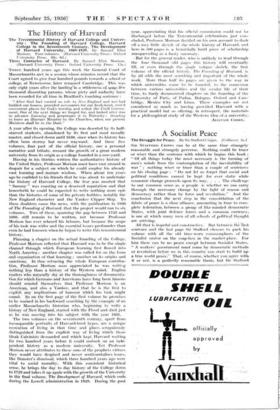The Tercentennial HiStory of Harvard College and Univer- - sity
: The Founding of Harvard College, Harvard .
• College in the Sevehteenth -Century, The Development-
The History of Harvard
.. of Harvard University, 1869-1929. By Samuel Eliot Morison. Four volumes. (Harvard University Press : Oxford University Press. 83s. 6d.) Three Centuries of Harvard. By Samuel Eliot Morison. - (Harvard University Press : Oxford University. .Preiss. 13s.)
THREE hundred years ago this week the General Court of Massachusetts met in a session whose minutes record that the
Court agreed to give four hundred pounds towards a school or college, at Newetowne, later renamed Cambridge. This was only eight years after the landingin_wwildernesSof anuac..few thousand dissenting parsons, whose piety and audacity haye been recorded for all time in Bradford's touching sentence :
• " After 'God had carried-us safe to New-England and wee had builded our_houses, provided necessaries for.our.liveli-hood, rimed convenient places for God's worship and setled the Civil! Govern- ment, One of the next things we longed for, and looked after was to advance Learrning and perpetuate it to Posterity ; dreading to leave an illiterate Ministry-to the Churches, when our present Ministers shall lie in the Dust."
A year after its opening, the College was deserted by its half- starved students, abandoned by its first and most rascally
master, and closed down until 1640, since when its history has often been stormy but - never wayward. And these five volumes, four .part of- the official history, one a personal narrative. and tribute, recount the.growth of a-great modern university from its origin as a college founded in a cow-yard.
• Having. in his thirties written the authoritative history of the United States; Professor Morison must have cast around in despair for a subject on which he could employ his already
vast learning ,hilid,thature wisdom. -When ,about ten years ago he confided to his friends that he was .about to undertake
the history of Harvard College, the fear ,was mooted that " Sammy " was coasting on a deserved reputation and that henceforth he -could be, expected to write nothing more epic
than the histories of some of his private hobbies, notably, the New England character and the Yankee Clipper Ship. To these doubters came the news, with the publication in 1930 of-The Founding of Harvard, that the project would run to six volumes. Two of these, spanning the gap between 1723 and 1869, still remain to. be written, not because Professor Morison has. ever ,relaxed his labours, but .because the scope of his task was wider and the essential issues profounder than even he had .toreseen when he began to write this tercentennial
history.
Planning a chapter on the actual founding of the College,
Frofessor Morison reflected that Harvard was to be the single channel through which European learning first flowed into North America ; another chapter was called for on the form and organisation of that learning ; another on its origins and sanctions. In thus retracing the whole European contribu- tion, Professor 'Morison soon appreciated he was writing
nothing less' than a history of the Aestern mind. English readers wit; naturally shy at the thoroughness of chicumentn-
tion for which Germans and Americans have long been famous ShoUld rethindtheinselves that PrOfessor Morison is an
American, and also a 'Yankee, and he is the first to . .
exploit any implications of Without- which his task might
Kma.' §o on the first page of the -first volume he promises . _
to be warned in his backward searching by the example of an
, earlier Massachusetts historian who, beginning to Write a
history of England,-started*ith the Flood and died just as he was' moving' into hig -Subject with the year 1631. . The two volumes on the seVenteenth century, apartfrom incomparable portraits oP Harvardbred types, are a unique • recreation of living in that time -and place, scrupulouSly distinguished from the explicit way of living which thoSe bleak Calvinists-- 'demanded and which kept Harvard waiting Kir two 'hundred years before it- could embark on an hide- pendent history as a modern university. Yet Professor Morison never attributes to these sons of the prophets virtues they would have despised and never sentimentalises issues, like 'Minster's dismissal, which three hundred years ago were Vital to social morality. With this consistent historical sense, he brings the day to day history of the College down to 1723-and takes it up 'again-with the growth of the University in the fthl volume, 'The Developinent of Harvard,- which ends during the Lowell administration in -1929, During 'the past year, appreciating_ that his. official commission could not be discharged before -the Tercentemnal celebrations just con- cluded, Professor Morison decided on his own account to dash of a racy little sketch of the whole history of Harvard, and here in 500 pages is a beautifully' lucid piece of scholarship
masquerading as a hasty summary. -
But for the-general reader, who- is unlikely to•iVad through the four thousand odd pages this history will eventually fill, or even through the single volume sketch, the first volume of the official history, The Founding of Harvard, is by all odds the most searching and important of the whole work. More than half its pages are- given to the way in which universities come to be founded, to the connexion between various universities and the secular life of their time, .to finely documented chapters on the founding of the University of Paris, of Padua, Bologna, Oxford and Cam- bildge, Mexico - City and 'Lima. These examples are not considered so much as having provided Harvard with -a practical model but as 'offering; in -retrospect, the materials for a philosophical study of the Western idea of a university: -ALISTAIR COOKE..


















































 Previous page
Previous page